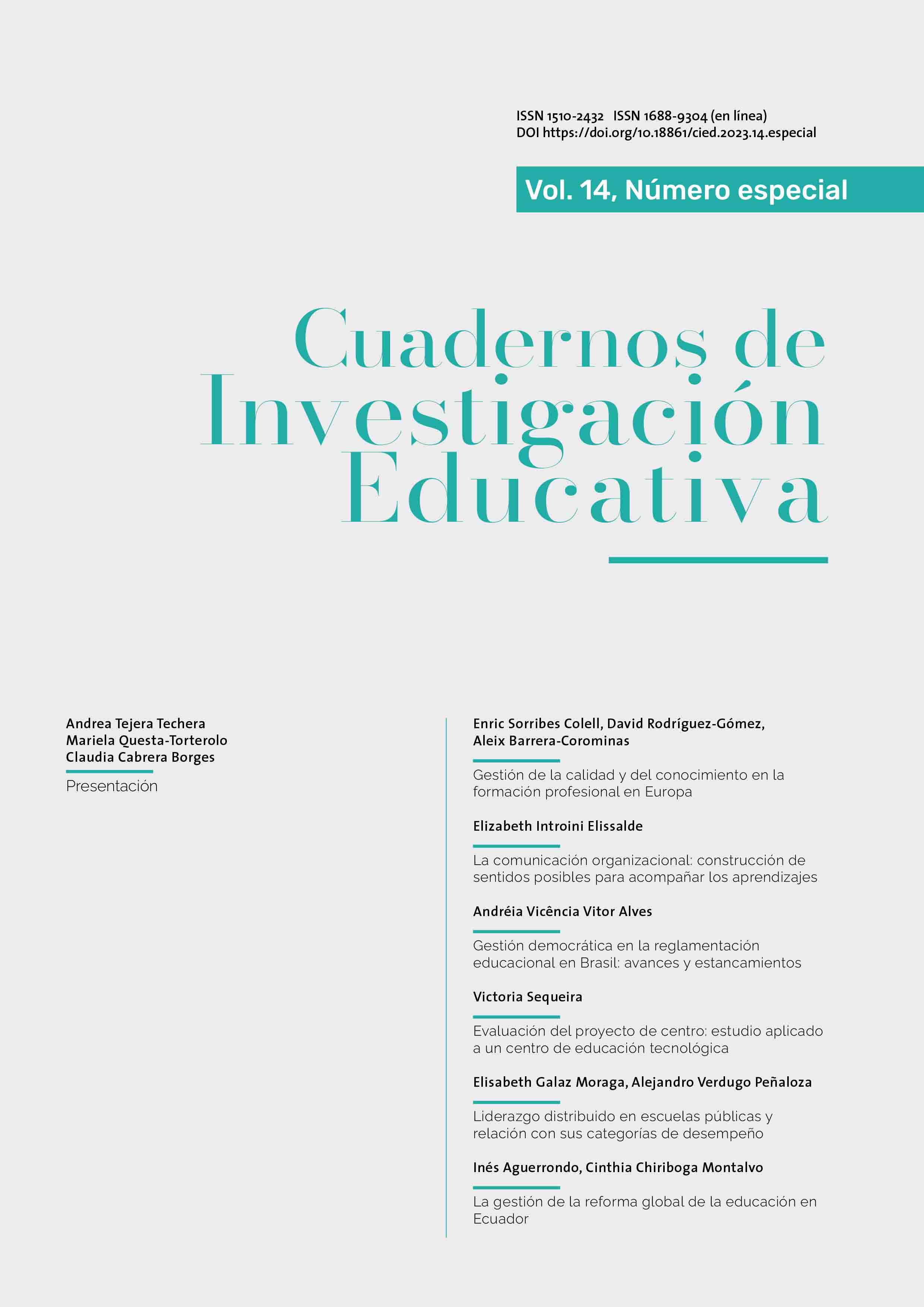Organizational communication: construction of possible meanings to accompany learning
DOI:
https://doi.org/10.18861/cied.2023.14.especial.3345Keywords:
organizational communication, school management, leadership, school effectiveness, school environment, learning process, applied research, COVID-19Abstract
This article accounts for applied research in an educational organization within the framework of the Master in Educational Management of the Universidad ORT Uruguay. It intends to understand a problem that arises as a demand in an educational center and present a possible improvement proposal, the product of collaborative work with a driving team. The problem is linked to organizational communication and specifically to the difficulties in achieving a fluid exchange between the management team and some of the organization's officials, which negatively impacts the main purpose they pursue: to better accompany and monitor students, especially at a time when the COVID-19 pandemic led the education authorities to suspend attendance, and there was no other way than that of virtuality. Understanding the problem makes it possible to visualize that this difficulty affects other aspects of the organization, not collaborating to transform individual work schemes that reinforce the presence of a balkanized culture, nor does it promote greater involvement and strengthen the sense of belonging. The results obtained in the different phases of the investigation lead to the conclusion that, in this case, the forms of communication and the difficulties that arise are an obstacle to achieving the main purpose and affect the organization in other ways. For this reason, the improvement proposal implies elaborating a plan with various actions that aim at a more fluid communication, where its transversality predominates, also promoting a greater involvement of the different actors that enables better performance of their role and a greater sense of belonging.
Downloads
References
Aldunate, E., & Córdoba, J. (2011). Formulación de programas con la metodología del marco lógico. CEPAL.
Andrade, H. (2009). Definición y alcance de la comunicación organizacional. En C. Fernández Collado (Coord.), La comunicación en las organizaciones (pp. 11-17). Trillas.
Barrera-Corominas, A., Bengoa, M., Guedes de Rezende, C., Rodríguez-Gómez, D., Tejera, A., & Vázquez, M. (2011). Clima organizativo y liderazgo. La dirección de centros educativos en Iberoamérica, reflexiones y experiencias. Santillana.
Blejmar, B. (2005). Gestionar es hacer que las cosas sucedan. Noveduc.
Blejmar, B., Nirenberg, O., & Perrone, N. (1998). La juventud y el liderazgo transformador. Conceptos y estrategias en mundos inciertos y turbulentos. Kellogg.
Bolívar, A. (1993). Culturas profesionales en la enseñanza. Cuadernos de Pedagogía, 219, 68-72.
Cantó-Milà, N., Gonzàlez, I., Martínez, R., Moncunill, M., & Seebach, S. (2021). Distanciamiento social y COVID-19. Distancias y proximidades desde una perspectiva relacional. Revista de Estudios Sociales, 78, 75-92. https://doi.org/10.7440/res78.2021.05
Castañeda, L., Esteve, F., & Adell, J. (2018). ¿Por qué es necesario repensar la competencia docente para el mundo digital? RED, 18(56), 1-10.
Escalante, J., Olivarez, J., Abraham, J., Villa, M., Aranda, M., & Segundo, M. (2009). Modelo de gestión educativa estratégica. Secretaría de Educación Pública.
Farfán, M., & Reyes, I. (2017). Gestión educativa estratégica y gestión escolar del proceso de enseñanza-aprendizaje: una aproximación conceptual. REencuentro. Análisis de Problemas Universitarios, 28(73), 45-61.
Fernández Collado, C. (2009). La comunicación en las organizaciones. Trillas.
Gairín, J. (2007, noviembre). Aspectos institucionales de la orientación. Congreso Internacional de Orientación educativa y profesional, Castellón, España.
Gairín, J., & Rodríguez-Gómez, D. (2011). Cambio y mejora en las instituciones educativas. Educar, 47(1), 31-50.
Hernán, M., Lineros, C., & Ruiz, A. (2020). Cómo adaptar una investigación cualitativa a contextos de confinamiento. Gaceta Sanitaria, 35(3), 298-301.
Hernández, R., Fernández, C., Baptista, M., Menéndez, S., & Mendoza, C. (2014). Metodología de la investigación. McGraw Hill.
Introini, E. (2022). La comunicación organizacional: buscando la sinergia de las partes en un liceo público de Montevideo. [Tesis de maestría, Universidad ORT Uruguay]. Sistema de Bibliotecas de la Universidad ORT Uruguay.
Montalva, A. (2020). Los desafíos de la comunicación virtual en tiempos de pandemia. Cultura, 34. https://doi.org/10.24265/cultura.2020.v34.05
Murillo, P. (2004). Hacia la construcción de un nuevo modelo de asesoramiento-supervisión. Educare, 8, 44-57.
Núñez, I. (2004). La gestión de la información, el conocimiento, la inteligencia y el aprendizaje organizacional desde una perspectiva socio-psicológica. ACIMED, 12(3).
Papic, K. (2019). Los tipos de comunicación organizacional interna en establecimientos educacionales municipalizados en Chile. Cuadernos de Investigación Educativa, 10(1), 63-83. https://doi.org/10.18861/cied.2019.10.1.2881
Pareja, J. (2009). Liderazgo y conflicto en las organizaciones educativas. Revista Ensayos, 12(1), 137-152.
Restrepo, M. (2020). La comunicación no es lo que parece. Una relectura de fondo. Inmediaciones de la Comunicación, 15(2), 27-41. https://doi.org/10.18861/ic.2020.15.2.3008
Rivera, A., Rojas, L., Ramírez, F., & Álvarez, T. (2005). La comunicación como herramienta de gestión organizacional. Revista NEGOTIUM, 1(2), 32-48.
Robbins, S., & Judge, T. (2009). Comportamiento organizacional. Pearson Educación.
Schein, E. (1988). La cultura empresarial y el liderazgo. Una visión dinámica. Plaza & Janés.
Yin, R. (2014). Case study research: design and methods. Sage publications.






